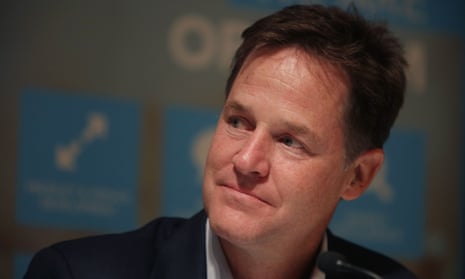Theresa May should return the UK to the same 1960s trading arrangements it had with Europe before it joined the EU if she decides there is no alternative to a hard Brexit, according to former deputy prime minister Nick Clegg.
Before a major speech by the prime minister on Tuesday, in which she is expected to lay out more details of her Brexit plans, Clegg says the “most sensible and softest” option would be for the UK to re-enter the European Free Trade Area (Efta), which it was instrumental in establishing 57 years ago.
Clegg’s latest intervention, in an interview with the Observer, comes amid growing expectation that May will move towards a hard Brexit by making control of immigration the priority in exit negotiations, even if this means a weakened UK relationship with the single market and no involvement for British ministers in making its rules.
Labour’s spokesman on Brexit, Keir Starmer, writing for the Guardian, says it now seems “highly likely that the prime minister will signal on Tuesday that she is giving up on [single market] membership”. Starmer has spelled out a series of demands she must meet, including that the UK must not revert to World Trade Organisation rules that would mean the imposition of trade damaging tariffs. Starmer also calls for guarantees to be given, before article 50 negotiations begin, that the more than 2.5 million EU citizens resident in the UK can remain permanently.
Clegg’s proposal for a return to Efta would mean the UK teaming up with its four current members – Norway, Iceland, Liechtenstein and Switzerland – in a body set up by the British in 1960 explicitly to provide a free trade alternative to European integration after the EU’s founding members signed the treaty of Rome in 1957.
Clegg insists he remains passionately against leaving the EU and will continue to press for a vote on the final deal in the hope that Brexit can be avoided, in line with his party’s position.
“I will continue to argue that Brexit is a bad thing but all the indications are that we are heading that way,” he said. “In the meantime, given this is where the country and the government is, I feel duty bound to push them to take sensible decisions and not idiotic ones. This is a model which they appear not to have thought about.”
While recognising that other Efta members, including Norway, have serious reservations about the UK rejoining, Clegg says he believes it remains a viable option. Membership would mean the UK remained inside the single market (though would have no say in making its rules), but would leave the customs union. It would no longer be a member of the common agricultural or common fisheries policies, though could pay to retain membership of EU schemes such as the Erasmus education programme.

Efta also allows its members the potential to suspend rules on free movement if a case can be made for doing so, and it would mean the UK was no longer subject to “supranational” institutions, including the European court of justice. “Efta is an inter-government organisation, not a supranational one,” Clegg said.
“For the Brexiters who dream of a sepia-tinted return to the comforting simplicities of the past, this is entirely consistent with their wish to return to something that was invented in London and not elsewhere. It was quite literally made in Britain.”
One concern in Norway is that UK membership would tilt the balance of power in Efta. The Norwegians also say that through Efta they have trade deals with 38 countries, including Mexico, Canada, Colombia, Morocco, Kuwait and Qatar. If the UK joined, those trade agreements might have to be renegotiated and future trade deals would become more complex.
In her speech at Lancaster House in London, May will call on remainers and leavers to stop the “insults” that have characterised the Brexit debate before and since the referendum and to unite behind her plans for a “global Britain”.
She is expected to say: “One of the reasons that Britain’s democracy has been such a success for so many years is that the strength of our identity as one nation, the respect we show to one another as fellow citizens and the importance we attach to our institutions means that when a vote has been held we all respect the result. The victors have the responsibility to act magnanimously. The losers have the responsibility to respect the legitimacy of the result. And the country comes together.
“And that is what we are seeing today. The overwhelming majority of people – however they voted – say we need to get on and make Brexit happen. Business isn’t calling to reverse the result, but planning to make a success of it. And the House of Commons has voted overwhelmingly for us to get on with it too.
“So the country is coming together. Now we need to put an end to the division and the language associated with it – leaver and remainer and all the accompanying insults – and unite to make a success of Brexit and build a truly global Britain.”

Comments (…)
Sign in or create your Guardian account to join the discussion